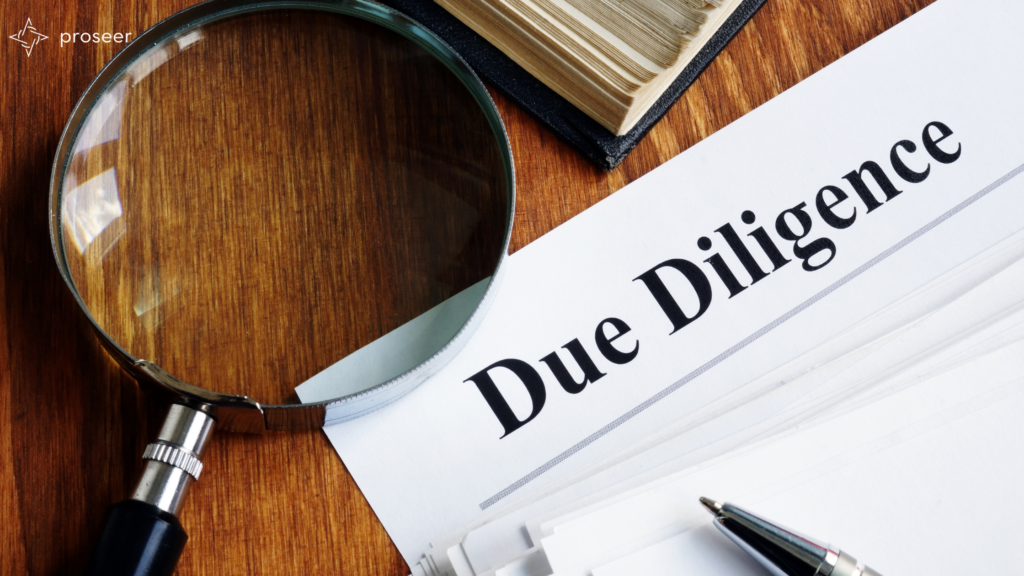In the dynamic world of entrepreneurship, due diligence plays a pivotal role. It’s not just about crunching numbers; it’s about understanding the financial health of your business, making informed decisions, and paving the path to success. This blog post will guide you through the intricacies of due diligence and how mastering it can be a game-changer for your business.
Table of Contents
- What is Financial Due Diligence?
- Navigating the Financial Landscape: Key Components of Due Diligence
- Decoding the Scope of Due Diligence
- From Startup to Standout: Skills Needed for Due Diligence
- From Knowledge to Power: Benefits of Mastering Due Diligence
- Due Diligence Checklist
- Financial Decision-Making for Startups
- Expert Guidance
- Conclusion
What is Financial Due Diligence?
Financial due diligence is a systematic process of investigating, auditing, or reviewing a business’s financial records before entering into a transaction or making an investment or financial decision. It’s a crucial step that investors perform with startups and other businesses to mitigate risks and ensure a sound financial footing. Investors and lenders will be looking to make informed decisions that align with their business goals and objectives. By mastering this process, startups can prepare and give themselves the best chance of a positive outcome.
Scenarios Requiring Financial Due Diligence
- Mergers and Acquisitions (M&A): Before acquiring or merging with another company, a thorough examination of the target company’s financial health is essential. This includes analyzing assets, liabilities, revenue streams, and potential risks.
- Investment in Startups: Investors, such as venture capitalists or angel investors, conduct financial due diligence to assess the financial viability of a startup before investing. They look at the company’s financial projections, cash flow, and overall financial stability.
- Securing Loans: Banks and other financial institutions require a comprehensive review of a company’s financial records before approving a business loan. This ensures that the company has the ability to repay the loan.
- Joint Ventures and Partnerships: When entering into a joint venture or partnership, both parties may conduct financial due diligence to ensure that the collaboration aligns with their financial goals and that the other party is financially stable.
- Real Estate Transactions: Buyers and investors in real estate may conduct financial due diligence to assess the property’s value, potential profitability, and any underlying financial risks.
Navigating the Financial Landscape: Key Components of Due Diligence
Financial due diligence is a multifaceted and systematic approach that requires careful planning, execution, and analysis. It’s not merely a review of numbers but a comprehensive evaluation that provides a clear understanding of a company’s financial position, potential risks, and opportunities. The process is typically conducted in several key stages, each contributing to a well-rounded view of the business’s financial landscape. Here’s a closer look at the essential steps involved in the financial due diligence process:
- Preparation: The process begins with the company organizing the information in one centralized place, typically an electronic data room or shared drive. Additionally, the company performing the analysis will define the scope of the due diligence, including the specific areas to be investigated, such as financial statements, tax records, contracts, and legal compliance.
- Analysis: A detailed analysis is conducted to assess the company’s financial health, profitability, liquidity, and potential risks. This includes evaluating financial trends, identifying inconsistencies, and comparing the company’s performance with industry benchmarks.
- Site Visits and Interviews: Meeting with management and key personnel, and visiting the company’s facilities can provide valuable insights into the company’s operations and culture.
- Risk Assessment: Identifying potential financial risks, such as outstanding liabilities, pending legal issues, or over-reliance on a single revenue source, is crucial for understanding the potential challenges and mitigating them.
- Report Preparation: A comprehensive report is prepared, summarizing the findings and providing recommendations. This report is usually provided to an investment or credit committee to analyze. This report is a critical tool for decision-making and negotiation in the transaction process.
- Negotiation and Decision Making: Based on the findings, the parties involved may negotiate the terms of the transaction, such as the purchase price in an acquisition, or make informed decisions about proceeding with the transaction.
By following these steps, investors, lenders, and business owners can gain a deep understanding of the financial aspects of a potential transaction or investment. This process helps in making informed decisions that align with the strategic goals and minimizes unforeseen risks, ultimately leading to successful business outcomes.
Decoding the Scope of Due Diligence
Due diligence for startups is a tailored process, varying with the startup’s industry, size, and business model. For instance, a tech startup might focus on recurring revenue, assessing burn rate and capital allocation efficiency, while a retail startup could prioritize inventory turnover and sales per square foot. In contrast, a healthcare startup might concentrate on regulatory compliance and cost structure. Each case involves a comprehensive process that goes beyond numerical analysis, providing valuable insights to guide financial decision-making and contribute to success.
From Startup to Standout: Skills Needed for Due Diligence
Preparing for due diligence demands a set of essential skills that startup founders and entrepreneurs must possess or acquire. These skills include financial analysis, data interpretation, and attention to detail. While some entrepreneurs may already possess these skills, others can seek expert advice or training to strengthen their financial acumen.
Furthermore, startups can access support from their accounting or finance firms to provide specialized expertise, helping them bridge any skill gaps and optimize their due diligence processes.
From Knowledge to Power: Benefits of Mastering Due Diligence
Mastering due diligence can offer numerous benefits for startups. By understanding the demands of investors and lenders, founders can improve their decision-making and pave the way for success. By understanding the financial landscape and making informed decisions, startups can mitigate risks, seize opportunities, and drive growth.
Additionally, preparing for the due diligence process in advance will enhance a startup’s credibility in the eyes of investors and stakeholders, paving the way for potential funding and partnerships. Finally, it minimizes the risks of unforeseen financial pitfalls, ensuring a steady and sustainable growth trajectory.
Due Diligence Checklist
An organized and comprehensive due diligence checklist and data room is a startup’s best friend during this process. The checklist acts as a roadmap, guiding entrepreneurs through the necessary steps and ensuring nothing is overlooked.
To create an effective due diligence checklist, startups should include items such as financial statements, tax records, material contracts and agreements, and legal documentation. Regularly updating and maintaining the checklist or data room ensures startups stay well-prepared for financial assessments and future opportunities.
Financial Decision-Making for Startups
Financial decision-making is at the core of a startup’s success. By analyzing and understanding the financial data and insights obtained through the due diligence process, entrepreneurs can make recurring informed choices that maximize profitability and growth and mitigate risks.
Effective financial decision-making involves setting clear goals, evaluating available options, and understanding the potential consequences of each choice. Implementing the right strategies and best practices enables startups to optimize their financial performance and drive growth.
Expert Guidance
For startups seeking to prepare for the due diligence process, expert guidance is invaluable. Accounting firms can offer specialized expertise in conducting due diligence assessments, interpreting financial data, and providing strategic recommendations.
By collaborating with experts, businesses can gain a competitive edge and access resources that might otherwise be out of reach. Expert guidance serves as a catalyst for efficient financial decision-making and consolidating business positions.
Conclusion
In conclusion, preparing for the due diligence process is an important key to preparing a startup for success. By understanding its significance and components, customizing the scope, and acquiring or accessing the right skills, entrepreneurs can make well-informed decisions and position their businesses for successful outcomes.
Moreover, a comprehensive due diligence checklist acts as a reliable ally throughout the process, while expert guidance ensures startups stay ahead of the curve. To thrive in the competitive landscape, startup entrepreneurs must embrace due diligence as a powerful tool for business consolidation and achieving long-term success. Contact us today to learn about how we can help your business prepare for upcoming due diligence.

